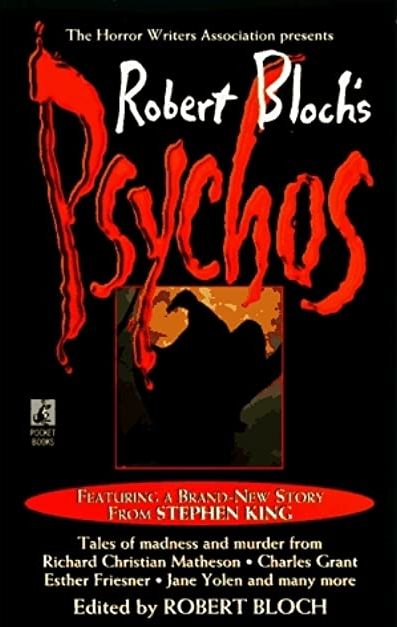|
Robert Bloch's Psychos Book review by Thomas M. Sipos |
|
MENU Books Horror Film Festivals and Awards
Pursuits
Blogs Horror Film Festivals and Awards
Other
|
Robert Bloch's Psychos (edited by Robert Blocks,
Pocket Books, 1998, 366 pp.)
A man thought dead, but actually paralyzed and conscious, is prepared for an autopsy. An old plotline, which King acknowledges by alluding to the similar Alfred Hitchcock TV episode. King adds some cute, albeit minor, variations. It's still a story of will they or won't they cut?
* Haunted, by Charles Grant. A poetic tale of a bum with a mission. Grant effectively toys with our preconceptions, repeatedly altering our expectations (is the bum good or evil, dangerous or vulnerable, crazy or sane?), until the final twist, which is both surprising yet logical within its context.¨
* Out There in the Darkness, by Ed Gorman. Four suburban yuppies turn vigilante, with unexpected consequences. The ethnic distribution of characters is prominently and self-consciously PC, down to such minor details as a police phone being answered by a black voice. Still, this tight, atmospheric novella moves briskly, successfully balancing supernatural and superstition. Are street criminals demons or do they merely appear so through the prism of suburbanite fear? Crisp dialogue and a good read.
* Please Help Me, by Richard Christian Matheson. The last minute stream of consciousness of a man about to be killed by¨ gangstas. No story, just a short-short without surprise or twist. Packs a minor emotional punch, but forgettable.
* The Lesser of Two Evils, by Denise M. Bruchman. A supernatural battle between Jack the Ripper's spirit, the killer he possesses, and an ancient gypsy woman. Their metaphysical duel is absorbing and well-handled, but the outcome and details are not unexpected.
* Point of Intersection, by Dominick Cancilla. A science fiction tale of a time traveler seeking vengeance. Lean, fast-paced, and full of unexpected twists. Highly satisfying.
* Doctor, Lawyer, Kansas City Chief, by Brent Monahan. A former football star/TV sportscaster is framed in a murderous conspiracy. Sounds like OJ, but more original than that. We never know where the story's going till we get there, and Monahan maintains our interest throughout. Good repartee between patient and psychiatrist leads to a surprise ending.
* Grandpa's Head, by Lawrence Watt-Evans. A poignant opening, preparing grandpa for a nursing home, followed by a quick succession of shocks. Understated dialogue is both funny and unsettling, and the pace never slackens.
* Lonelyhearts, by Esther M. Friesner. A stock broker slaughters women. Shades of American Psycho and a bit wordy (one pitfall of first person narratives is their tendency to ramble), but Friesner's increasingly chilly story ends in a black comic twist reminiscent of TV's Alfred Hitchcock Presents. Cute and unexpected.
* Lighting the Corpses, by Del Stone Jr. A supernatural take on the cycle of child abuse. From innocent to serial killer to evil spirit. Nice metaphors. Moments of insight, but also moments of cliché.
* Echoes, by Cindie Geddes. A psychological take on the cycle of child abuse. A soap opera star imagines seeing her former abuser everywhere. She defends herself and her daughter, with surprising results. Very satisfying.¨
* Lifeline, by Yvonne Navarro. A supernatural tale of a serial killer/witch who escapes police by exchanging bodies with her grandmother. Not immediately apparent why she chooses the body of a sickly 91-year-old. On speculation some possibilities arise, but this subtle story requires some thought.¨
* Blameless, by David Niall Wilson. A mother's adultery leads to hallucinations. Her attempts to eradicate evidence of her affair are reminiscent of Bradbury's "Fruit at the Bottom of the Bowl." A tense and gripping tale, though the surprise ending is a bit of a leap.¨
* Deep Down There, by Clark Perry. Two men share a secret about a high school chum's death. The cave scenes are effectively claustrophobic and the novella builds suspense with its nicely detailed subtext. But maybe too many details, as they don't all connect and the ending falls short of the buildup. But perhaps it's Perry's intention to be subtle; I'm left wondering, are the subterranean creatures supernatural, or of the minister's own guilty mind? Then again, I'm not certain if I'm supposed to be left wondering.¨
* Knacker Man, by Richard Parks. Title refers to a schizophrenic Jack the Ripper's occupation (buying and selling livestock carrion) thirty years after his Whitechapel heyday. Parks's British period dialects sound right. His story is thoughtful and intriguing, with an original twist ending.¨
* So You Wanna Be a Hitman, by Gary Jonas. This short noir crime thriller effectively captures lowlife attitudes and dialogue, but it's nothing we haven't seen before. Entertaining but clichéd.¨
* The Rug, by Edo van Belkom. An old woman hides her murder victims under a hungry rug. An absurdist tale reminiscent of TV's Tales From the Darkside. Slight, but comical and fun.¨
* Interview With a Psycho, by Billie Sue Mosiman. An aging backwoods psycho relates his life story to a young writer. A tense tale, but its evocative period and locale descriptions are marred by a blooper. The year is 1965, the psycho is 81. So how is it that when he killed at age 32, his victim was driving a 1950 DeSoto? Also, the ending (and answer to the question: will he or won't he kill the writer?) is not entirely unexpected.¨
* Icewall, by William D. Gagliani. Two men isolated in an antarctic weather station. One goes crazy, the other one... Story and characterization are both enjoyable, but most interesting are Gagliani's details about polar conditions, which easily rival "To Build a Fire."¨
* A Southern Night, by Jane Yolen. A very short-short, apparently inspired by Susan Smith, but don't ask me what it was about or what the ending meant. Confused and pointless.¨
* The Forgiven, by Stephen M. Rainey. A psycho seeks God by demanding love and forgiveness from his victims. The Christian literalism is intriguing, threading theological waters reminis¨cent of Blatty's Ninth Configuration, but the (arguably necessary) sadism is still distasteful.¨
* Safe, by Gary A. Braunbeck. A bittersweet novella detailing a teenager's mass murder spree, from frustrated working class motivations, to clinical shot-by-shot recounting, to long-term repercussions. The dating is ambiguous and doesn't accord with the ages of some characters. A second spree occurs 35 years after the first (placing it in the 2030s?) yet the story contains no confirming futuristic details. Braunbeck's poetic philosophizing on the endlessness of violence indicates that his temporal ambiguity might be intentional. This ambitious tale aims high and delivers.  |
"Communist Vampires" and "CommunistVampires.com" trademarks are currently unregistered, but pending registration upon need for protection against improper use. The idea of marketing these terms as a commodity is a protected idea under the Lanham Act. 15 U.S.C. s 1114(1) (1994) (defining a trademark infringement claim when the plaintiff has a registered mark); 15 U.S.C. s 1125(a) (1994) (defining an action for unfair competition in the context of trademark infringement when the plaintiff holds an unregistered mark).font>


 This
Horror Writers Association's anthology is more diverse than its
title implies. Not every story has a psycho. A few don't even
broach the subject. Still, with rare exception, the stories range
the gamut from enjoyable to highly enjoyable.¨
This
Horror Writers Association's anthology is more diverse than its
title implies. Not every story has a psycho. A few don't even
broach the subject. Still, with rare exception, the stories range
the gamut from enjoyable to highly enjoyable.¨